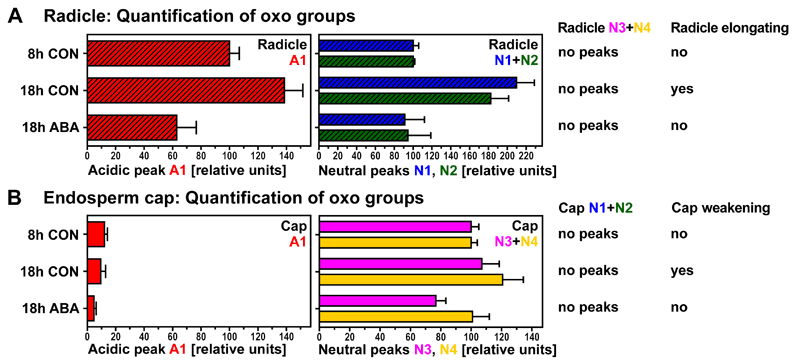Plant Physiology 150: 1855-1865 (2009)
In vivo cell wall loosening by hydroxyl radicals during cress (Lepidium sativum L.) seed germination and elongation growth [W][OA]
The Edingburgh Cell Wall Group, Institute of Molecular Plant Sciences, The University of Edinburgh, The King's Buildings, Mayfield Road, Edinburgh EH9 3JH, United Kingdom (R.A.M.V., S.C.F.)
Commissariat à l'Energie Atomique (CEA), iBiTecS, CNRS URA 2096, Service de Bioénergétique, Biologie Structurale et Mécanisme, 91191 Gif-sur-Yvette Cedex, France (A.K.-L.)
Received April 9, 2009; accepted May 29, 2009; published June 3, 2009
www.plantphysiol.org/cgi/doi/10.1104/pp.109.139204

Figure 5. Quantification of peak areas indicative of •OH-attack on polysaccharides in the radicle (A) and the endosperm cap (B). While a distinct acidic peak (A1) was only present in the radicle, neutral peaks were detected in all samples, but differed qualitatively between radicles (N1, N2 – see Fig. 3) and caps (N3, N4 – see Fig. 4). N3 was identified as [3H]arabinose (see Fig. 4B and 4C). Areas under peaks were normalized by setting the value at 8 h to 100. The physiological state of the seeds at the time of dissection is indicated. Mean values +/- SE of at least four replicates (200 radicles and 1000 caps used for extraction, respectively) are presented.
| Article in PDF format (1.5 MB) |
|
|
|
The Seed Biology Place |
Webdesign Gerhard Leubner 2000 |